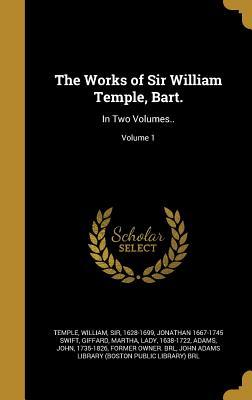The Works of Sir William Temple, Bart.: In Two Volumes..; Volume 1
by William Temple
This work has been selected by scholars as being culturally important, and is part of the knowledge base of civilization as we know it. This work was reproduced from the original artifact, and remains as true to the original work as possible. Therefore, you will see the original copyright references, library stamps (as most of these works have been housed in our most important libraries around the world), and other notations in the work.
This work is in the public domain in the United States of America, and possibly other nations. Within the United States, you may freely copy and distribute this work, as no entity (individual or corporate) has a copyright on the body of the work.
As a reproduction of a historical artifact, this work may contain missing or blurred pages, poor pictures, errant marks, etc. Scholars believe, and we concur, that this work is important enough to be preserved, reproduced, and made generally available to the public. We appreciate your support of the preservation process, and thank you for being an important part of keeping this knowledge alive and relevant.
This work is in the public domain in the United States of America, and possibly other nations. Within the United States, you may freely copy and distribute this work, as no entity (individual or corporate) has a copyright on the body of the work.
As a reproduction of a historical artifact, this work may contain missing or blurred pages, poor pictures, errant marks, etc. Scholars believe, and we concur, that this work is important enough to be preserved, reproduced, and made generally available to the public. We appreciate your support of the preservation process, and thank you for being an important part of keeping this knowledge alive and relevant.
BUY NOW
Hardcover
Published August 27th 2016 by Wentworth Press
© 2025 Bibleportal.com 版权所有.

William Temple was a priest in the Church of England. He served as Bishop of Manchester (1921–29), Archbishop of York (1929–42), and Archbishop of Canterbury (1942–44).
A renowned teacher and preacher, Temple is perhaps best known for his 1942 book Christianity and Social Order, which set out an Anglican social theology and a vision for what would constitute a just post-war society. Also in 1942, with Chief Rabbi Joseph Hertz, Temple jointly founded the Council of Christians and Jews to combat anti-Jewish bigotry.
... Show more